THE NEXT ADVENTURE
Joyce McConnell on becoming CSU’s 15th president by Tony Phifer published May 13, 2019Editor’s note: When Joyce McConnell accepted the position as CSU’s 15th president, SOURCE sent reporter Tony Phifer and videographer Jen Smith to Morgantown, West Virginia, to learn more about the woman who will lead the University into its 150th year – and beyond. Watch the video here, and read the story below.
The campus community has been abuzz with talk of Joyce McConnell as the incoming 15th president of Colorado State University since she was officially named by the Board of Governors in March.
To say news of her selection has been extremely well-received would be, well, an epic understatement. Now everyone seems to know her name, but that was not the case just two months ago.
That’s no surprise, really. After all, McConnell was the provost at West Virginia University and has no ties to the campus in Fort Collins, some 1,500 miles west of Morgantown, West Virginia. And while she had a glowing reputation among those in the higher education community, she had only recently decided to pursue opportunities outside the place she had called home for the past 23 years.
And as excited as folks at CSU are, the folks in Morgantown are sad – really, really sad – that McConnell is leaving WVU.
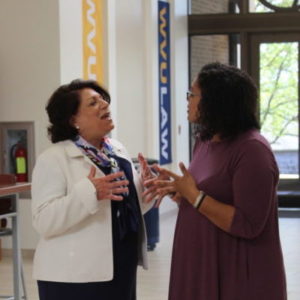
“I wasn’t particularly happy with you CSU folks – let me be very clear on that,” Jena Martin, a professor in the WVU School of Law, said while trying to make herself smile. “I just don’t know if CSU folks quite understand what a blessing they are getting. It’s a tremendous loss for us.”
“I felt sadness,” said Blake Humphry, currently a law student and former student body president at WVU. “When I heard the news I thought, wow, what a loss for WVU. But at the same time, I thought, wow, what a win for Colorado State.”
So, exactly what type of person inspires that level of emotion when leaving? Suffice it to say that CSU’s new president is pretty special. Consider:
• She once worked for a company based in Washington, D.C., that set up sound systems for rock concerts in that area. She didn’t work directly with the band members, and she wasn’t exactly a classic “roadie,” but she did set up for performers like Stevie Wonder, Bonnie Raitt, the Steve Miller Band, Rush and Emmy Lou Harris. “I was very low in the chain of command,” she said. “I was the person who could scramble up the stack of speakers with a roll of duct tape and make sure everything was connected.”
• She has on display in her office, nestled among numerous plaques and trophies, an orange clay pigeon – you know, one of those discs flung into the air before getting blasted by a shotgun. It represents her title as women’s champion of the West Virginia Bar Association’s skeet shooting contest. There was one other entrant; neither of them had ever shot skeet prior to the contest. “They also had golf and tennis, but I wanted to try shooting clay pigeons,” McConnell said, laughing. “It sounded like fun.”
But those examples are really just a small part of McConnell’s story. She is a lifelong, passionate learner who has always cared deeply for people, and those two driving forces have led her to become the first female president at CSU.
The early years
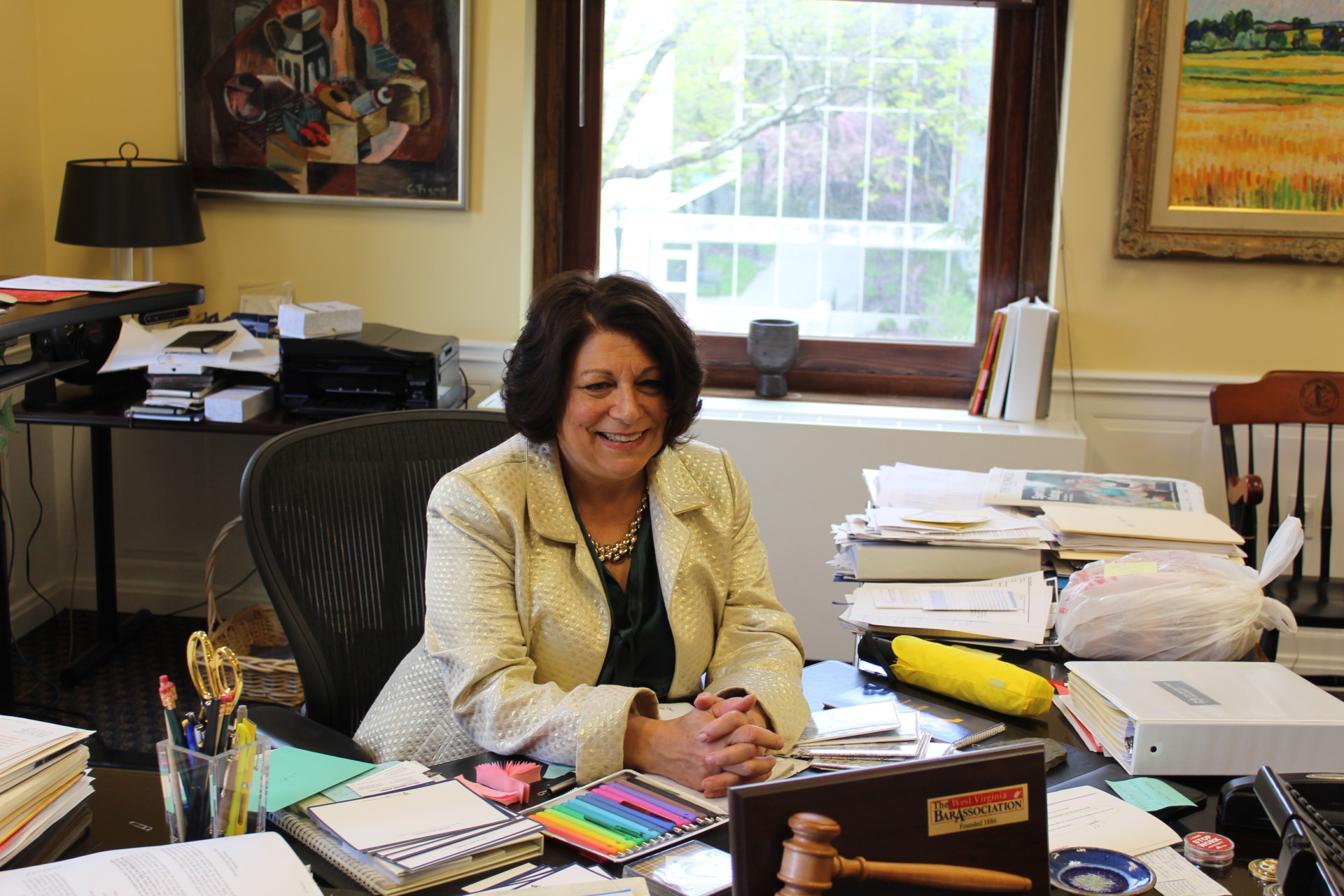
McConnell grew up in Maryland, just outside of Washington, D.C. The oldest of four children, her parents, both military veterans, encouraged their children to get out of the house and explore their world, learning everything they could.
McConnell took that advice to heart. She traveled to D.C. whenever possible, exploring dozens of museums and historic sites. She was a voracious reader from an early age, and she embraced the passion of the 1960s and ’70s from her front-row seat in the nation’s capital. Events like Martin Luther King, Jr.’s March on Washington, Watergate and the Vietnam War protests left an indelible mark on her – and she could follow all of the happenings in the Washington Post, which she read every day.
“It was an amazing place to grow up, and I have to say that one of the greatest privileges to living in a place like Washington, D.C., other than being able to go to all of the museums, was having the Washington Post as a hometown newspaper,” she said. “It was a very challenging time and it was at a time when, if you grew up there, you could really begin to understand your importance as a citizen.”
She particularly remembers the city’s reaction to King’s assassination in 1968, with protests and violence exploding across the city.
“The city just erupted in anger, and I watched the city burn – one entire corridor of it,” she said. “I remember National Guard troops in the streets, and tanks going down 14th Street. I remember what a profound impact it had on me and my family.”
Heading West
After graduating from high school, McConnell chose Evergreen State College in Olympia, Washington, for her first big adventure. If that choice seems a bit odd – an 18-year-old from Maryland attending a small liberal arts school 2,800 miles away in a place she had never visited – McConnell had a simple explanation.
“I’ve always had a restless spirit, although sometimes I call it a sense of adventure,” she said. “I liked their curriculum, and I wanted to be someplace where I could pursue my love of the outdoors.”
Evergreen’s location, near Puget Sound and surrounded by lush forests, afforded McConnell the opportunity to expand her love for hiking and camping. She still gets outside and experiences nature whenever she can, and she wants to make sure future generations have those same opportunities. She has served on the board of directors for the Nature Conservancy of West Virginia for the past 10 years.
“I’ve never seen anyone with quite the talent that Joyce has for reaching every single person she talks to and making them feel like they are part of the conversation, that they are important to the work going on, and that they can play a role,” said Thomas Minney, director of the Nature Conservancy of West Virginia. “She’s got that factor that motivates people to do their best. She helped us do bigger, bolder and better things for West Virginia. She asked, ‘How can nature be an important part of the economic transformation that happens in West Virginia?’”
After earning her undergraduate degree in 1979 she returned home and really started to set the foundation for her career, pursuing a degree from Antioch Law School, which is now part of the University of District of Columbia. She graduated in 1982 and went into private practice before being named a graduate teaching fellow at Georgetown University Law Center, igniting a passion for teaching and higher education that still burns brightly.
While she was at Antioch, she met her future husband, Vince Trivelli, then an aspiring attorney. They married in 1982 and had a daughter, Alexandra McConnell-Trivelli, now an events coordinator in Brooklyn, New York. They are a tight-knit family, and talk several times weekly when they cannot connect in person. Vince has a thriving law practice in Morgantown that he plans to maintain for the time being.
Formative teaching experiences at the City University of New York School of Law (1987-94) and the University of Maryland School of Law (1994-95) during the height of the AIDS crisis opened her eyes to a sobering truth: teaching without understanding the world around you is unsatisfactory. She remembers numerous impactful experiences dealing with the consequences for young mothers infected with AIDS who failed to get care for themselves while caring for their children.
“I remember being called by the social worker at the hospital saying that we had to come over with a team of students right away because a woman had just presented herself in the emergency room and they didn’t think she was going to live,” she said. “She had been sick for a long time before coming in for help, and she needed our assistance while in the process of dying.
“These little children were so beautiful and needed so much love. When you could help a mother make a decision about who was going to take care of those precious children, that meant everything.”
‘The House That Joyce Built’
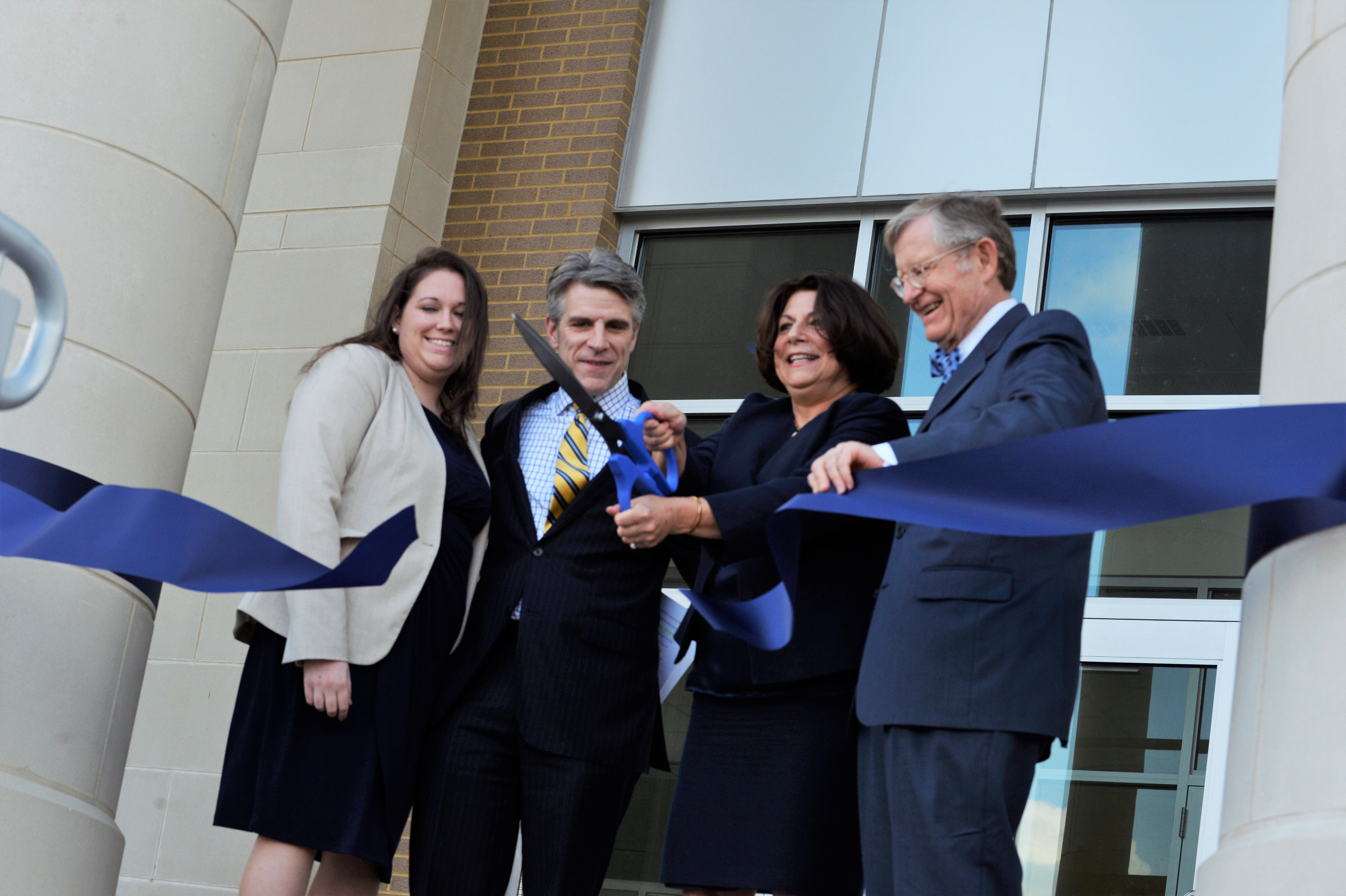
When McConnell accepted the job as CSU’s 15th president, she took an incredible leap of faith. After all, she had never been to Fort Collins and had never set foot on the campus she soon would be leading until the day she was named president. She shrugged off the suggestion that this was unusual by saying the decision fit with her lifelong spirit of adventure.
She took a similar leap in 1995 when she left Maryland and the area she knew best to become an assistant professor of law at West Virginia. This was certainly not New York City or Washington, D.C., but she and Vince fell in love with Morgantown, the Appalachian Mountains and the lush forests of the area. It was close enough to the cities they loved that they could still visit on a regular basis but far removed from the turmoil that had marked their daily existence for so long.
McConnell put together a distinguished teaching career and in 2008 was named dean of the law school. She quickly set about to change the trajectory of the school and transform the aging building that housed its program – the basement of which was not very affectionately known as “the dungeon.”
Over the course of six years, she raised $38 million to completely renovate and expand the building to make it more student- and teacher-friendly. It’s a bright, welcoming facility on a hill overlooking the football stadium and medical school.
It opened in 2014 to rave reviews and has helped elevate the prestige of the law school. McConnell not only raised the money, she came up with several of the design ideas and was a visible presence in the three-year construction phase, making sure her vision came to life.
“Joyce was a transformational leader of the law school,” said Greg Bowman, who replaced McConnell as dean. “She took a law school that was very good in a very old building and transformed it into a school with lots of different (public outreach) centers, more clinics and brand-new and renovated space. She was very focused on making sure the building was well-designed for both now and the future.”
Added Jena Martin, who was on the law faculty throughout construction: “We call it ‘The House That Joyce Built.’ Somehow it feels like it has doubled in size. It’s a warm place to meet, work and study.”
The next challenge
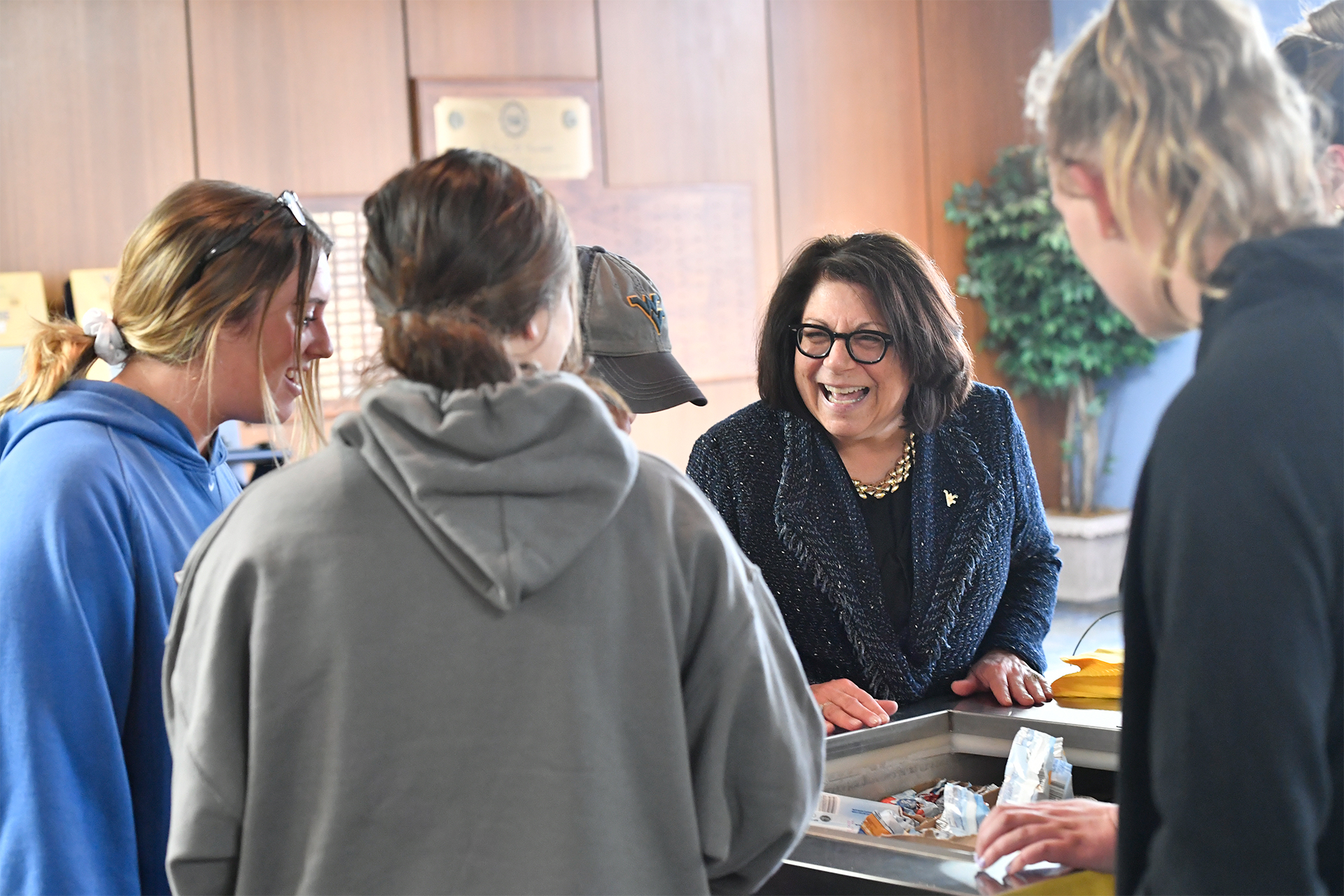
Two weeks after the building was completed, McConnell’s office phone rang. It was Gordon Gee. He had just been hired for his second go-round as president of WVU, and he immediately reached out to McConnell.
“I said, ‘Joyce, I need you to be my provost,’” said Gee, who began his current stint as WVU president in 2014 after previously serving at the University of Colorado, Ohio State (twice), Vanderbilt and Brown. “She said, ‘President Gee, I don’t want to be provost; I want to be dean of the law school.’ So, I had people call her to convince her to become my provost.”
McConnell confirmed Gee’s story. She was ready to enjoy the fruits of her labor while leading the law school, not serve as provost.
“I told (Gee) I hadn’t even unpacked my boxes in my brand-new office,” she said, laughing at the memory. “He said, ‘Good, you can just bring them right over to Stewart Hall (WVU’s equivalent of CSU’s Administration Building).’”
Gee and McConnell started in their new positions on the same day – July 1, 2014. In many ways it was an odd pairing: Gee had recently turned 70 and thought he was taking the job on a temporary basis until a permanent replacement was found. McConnell had never worked with undergrads during her 30-year career in higher education – law students already have their undergraduate degrees – and working with all 30,000 WVU students would be a big part of her new job.
Not only that, Gee was asking McConnell to take on several additional duties – engaging donors as part of WVU’s $1.2 billion campaign, reforming the Title IX office, establishing an Office of Global Affairs to increase campus internationalization, and even serving on the NCAA Division I Infractions Committee – not normally associated with provosts.
“Joyce is remarkable in capacity and creativity,” Gee said. “She has really moved WVU forward. She hadn’t had much experience with a land-grant university before she came here, but I think she now really understands and bleeds that land-grant mission. I call her Land-Grant Joyce.’”
(Some of) the rest of the story
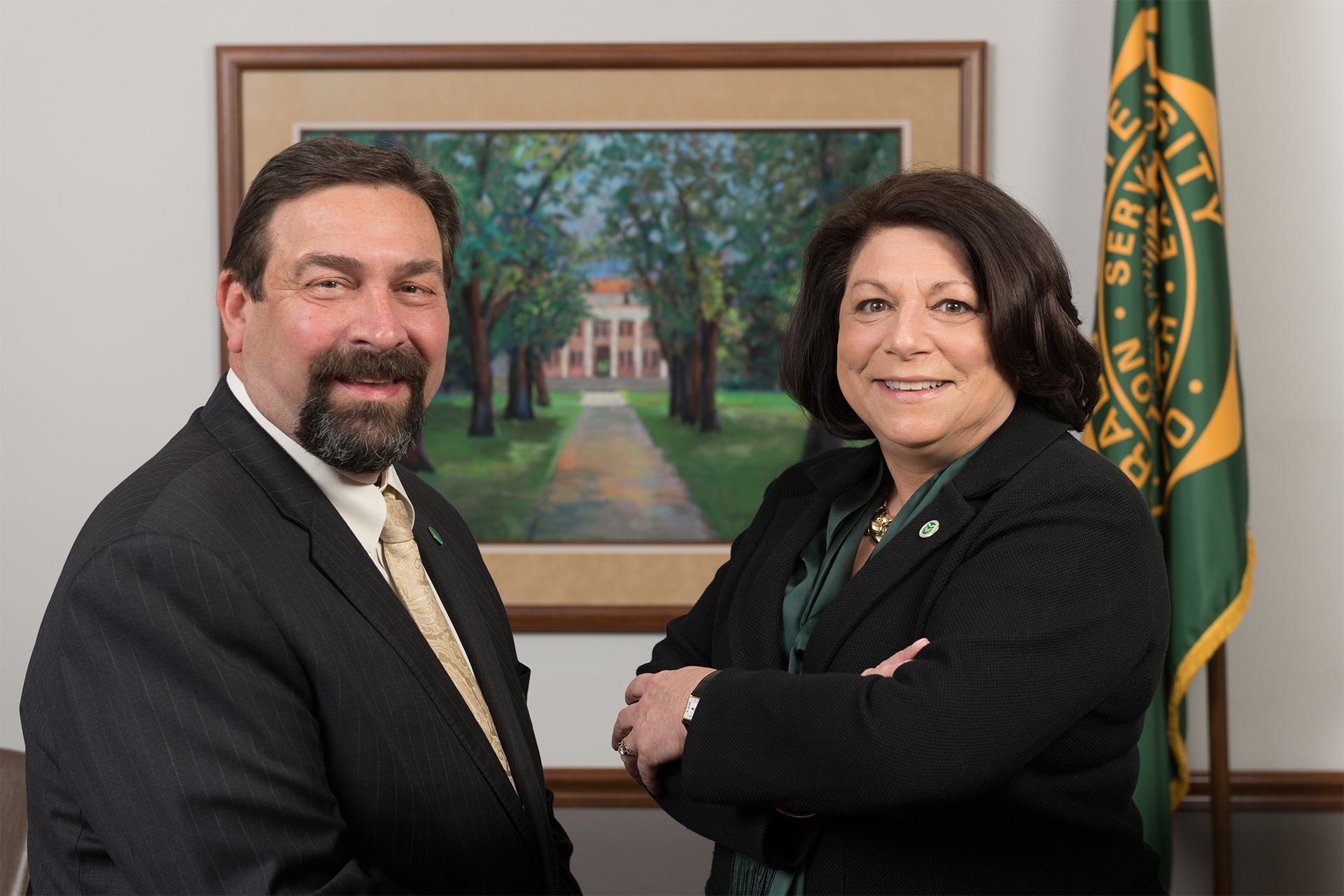
Here are a few other things you should know about McConnell as she prepares to take over for Tony Frank, when he steps into the role of full-time chancellor for the CSU System on July 1:
• DIVERSITY AND INCLUSION: She has been a tireless advocate for the LGBTQ community at WVU. “Twenty years ago, when Joyce was a professor in the law school, our LGBTQ students didn’t feel safe enough to meet on our campus,” said T. Anne Hawkins, clinical director of the WVU counseling center. “Joyce invited them to meet at her home. She didn’t have to do that, but that’s an example of how much she cares about all students.”
• AGRICULTURE: McConnell has long felt a special kinship with nature and the outdoors, so it was logical when Gee asked her to connect with West Virginia’s agricultural community. McConnell embraced the task while provost, reinforcing WVU’s longtime ties to agriculture. “There are very few people who have a more religious devotion to the land-grant mission than Joyce,” Gee said. “She quickly learned that the agricultural part of this state is very important, and she’s been a tenacious advocate for that community. She will do the same in Colorado.”
• ATHLETICS: McConnell appreciates and embraces the role athletics play on a college campus, particularly with a Division I program like those at CSU and WVU. She served on the search committee that brought current WVU football coach Neal Brown to campus, and serves on the powerful NCAA Committee on Infractions. “I think athletics play a really important role on a college campus, particularly one this large,” she said. “Athletics, in many ways, is very community-building – it brings people together who might not otherwise gather to celebrate. I think it’s really wonderful for our student-athletes. I like to compare them to students in the band, students in the performing arts, and all others who work hard and commit themselves to something.”
• FUNDRAISING: Gee asked McConnell to take a prominent role in fundraising, which is somewhat unusual for a provost, but she connected with many of the state’s top donors in helping WVU’s “State of Minds” campaign bring in a record $1.2 billion. Her involvement was personal: While raising funds for the law school’s renovation, she drove six hours on winding, two-lane mountain roads “through the worst thunderstorm I’ve ever seen” to meet with a WVU alum about a gift, even though she had been told the donor would never contribute. She left with a check for $1 million.
Ready for the challenge
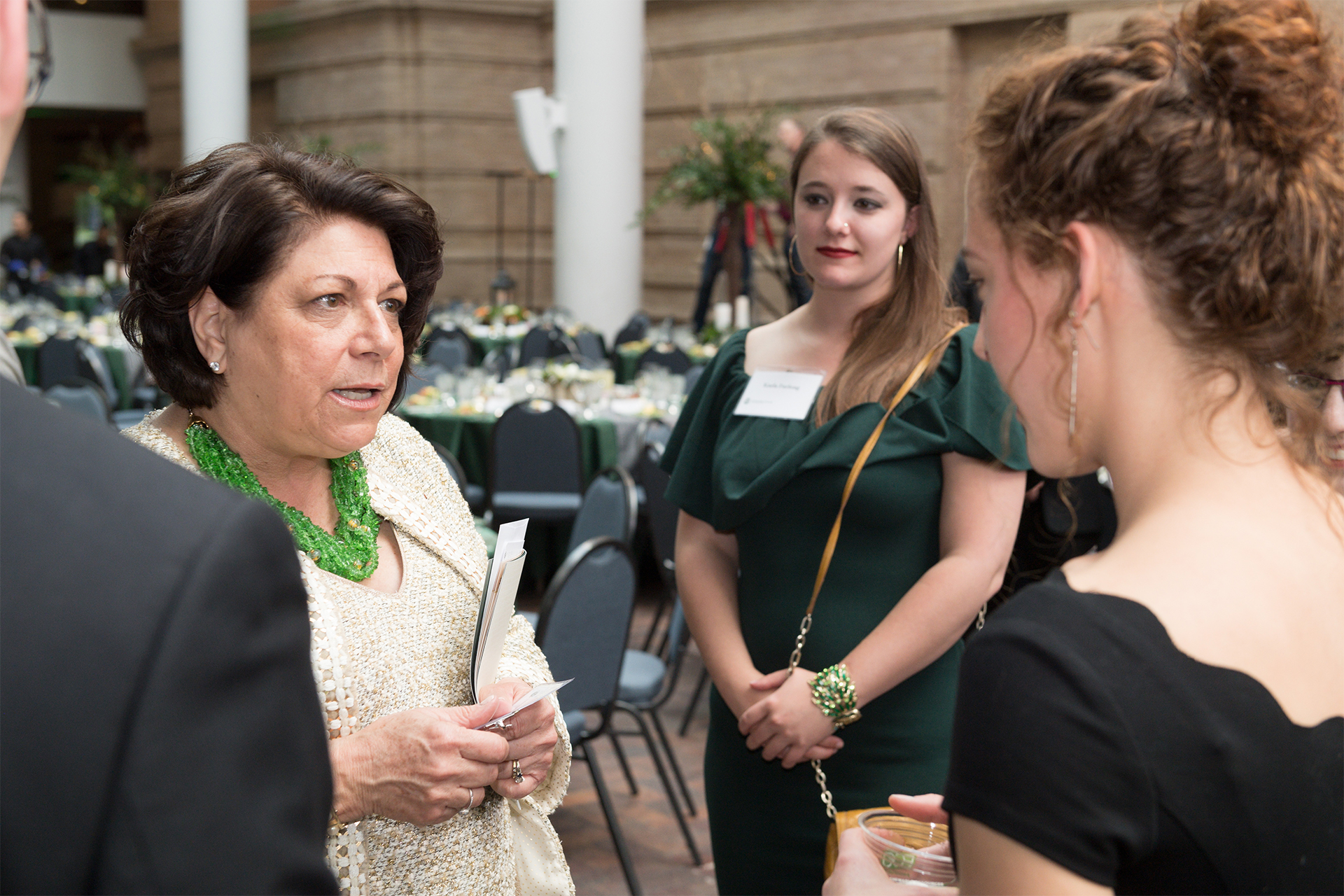
McConnell readily admits that becoming a university president really hadn’t crossed her mind until recently, but prodding from Gee and other trusted leaders in higher education convinced her to apply. Four months later, she was named CSU’s president.
Gee knew McConnell was ready before she did. He has had more than 20 people who worked for him go on to serve as university presidents, after all.
“At first Joyce didn’t want to be disloyal; I told her she could never be disloyal, and that loyalty to self is important, because you’re ready to take a leadership role at an institution and really make a difference,” he said. “I’m sending a gift to Colorado, and I think the marriage is perfect. She loves the outdoors, she loves the openness of the people and she loves the can-do attitude of Colorado. She’s a woman of the times and of the people.”
McConnell’s hiring was particularly bittersweet for Cari Carpenter, an associate professor of English and Native American Studies at WVU. Carpenter grew up in Fort Collins and her parents, Len and Jan Carpenter, are ardent CSU supporters.
“When the news broke, I had all these people from Fort Collins who were panicked because they didn’t know Joyce, and all these people in West Virginia who were panicked because she was leaving,” Carpenter said. “I had to console one group and let another know what a great person they were getting. Honestly, I’m a little jealous of Joyce because Fort Collins is such a special place and I know she’s going to do great job at CSU.”
As for McConnell, she couldn’t be more excited about her latest adventure. She knows there will be challenges, but she plans to focus on the principles that have guided her throughout her life: believe in people, treat everyone with respect, and provide opportunities to help others achieve their dreams.
“As I always say, if you give one student access, and that student becomes successful, forever after their family is affected by that success,” she said. “You’re empowering students to live lives that they never would have expected they could live, and that’s just extraordinary. I’m driven by that sense of purpose, and it makes me extremely happy. I can’t wait to get started at CSU.”